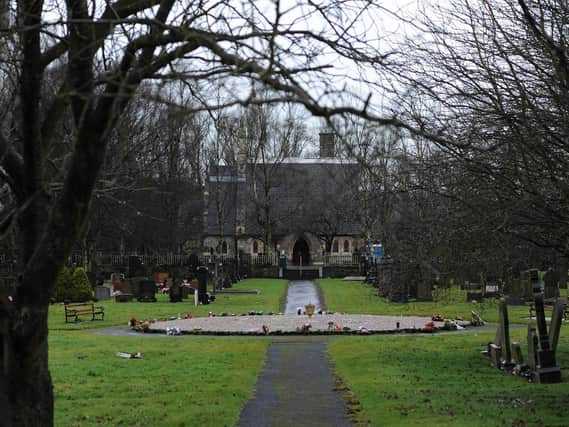Watchdog rejects woman's complaint that Wigan Council didn't bury her father properly


The Local Government Ombudsman (LGO) launched an investigation following the woman’s complaint that the local authority did not take action to prevent the grave from becoming waterlogged, following days of heavy rain leading up to the burial ceremony. She also alleged that council workers were disrespectful and intimidating to mourners during the burial.
But the ombudsman found no fault in the council’s actions and ruled that no further action should be taken against the town hall.
Advertisement
Hide AdAdvertisement
Hide AdThe woman, referred to in the report only as Mrs X, alleged that the council did not consider the poor weather conditions when burying her father, Mr Y, in March 2019. The location of the service was not revealed in the report.
She said the conditions caused the grave to become severely waterlogged and that she and her family had to repair it.
She was also unhappy the cemetery workers who interred her father behaved in manner that intimidated members of her family. She said this experience caused her and her family significant emotional distress.
The report said that prior to Mr Y’s burial at a council-run cemetery, it had rained heavily for several days.
Advertisement
Hide AdAdvertisement
Hide AdMrs X said some of her family members witnessed cemetery workers standing too close to the burial site, which they found intimidating. Family members also told Mrs X the cemetery workers jumped into Mr Y’s grave and began filling it whilst family members were still present.
Mrs X visited Mr Y’s grave the day after the funeral, along with some members of her family. They found Mr Y’s grave very waterlogged, with the edges of the grave collapsing inwards. The grave of Mrs X’s sister, who is buried next to their father, was also affected, which caused the family further distress.
After contacting the council to report what had happened, she was told that someone would attend the grave the following day.
A cemetery worker explained to Mrs X that there was clay soil left over, which was heavier than the soil used by the council workers to fill her father’s grave, and therefore less likely to sink during bad weather.
Advertisement
Hide AdAdvertisement
Hide AdSo the family decided to fix the grave themselves, by using the council’s equipment. This reportedly took them several hours.
Mrs X later complained to the council because she was unhappy with the cemetery workers’ conduct, and felt the council failed to take the weather conditions into account when burying her father, and she asked to be refunded the £866 interment fee.
The town hall apologised to the lady and her family for their experience, and explained that excessive rainfall caused her father’s grave to sink. But the funeral director had visited the cemetery the day after the funeral and found the grave in good condition, the report found.
The council said it had visited the site again the following day and topped up and mounded the grave because it had settled. They also investigated Mrs X’s complaints about the cemetery workers’ conduct, but no evidence was found of their alleged inappropriate behaviour.
Advertisement
Hide AdAdvertisement
Hide AdMrs X was offered a refund of £100 of the £866 interment fee she paid, as a goodwill gesture, but she was unhappy with this resolution, saying she had been told cemetery workers were at the cemetery on the day following her father’s burial.
Therefore, she said the council could and should have acted sooner to prevent her father’s grave becoming waterlogged. She also disputed the council’s assessment of the cemetery workers’ conduct during the service.
The council confirmed there were no official requirements for inspecting and backfilling graves, but it visited the grave at the earliest opportunity and would continue to monitor the grave in future.
The council also clarified that occasionally, cemetery workers need to enter the grave to backfill and remove metal shoring.
Advertisement
Hide AdAdvertisement
Hide AdThe council confirmed the workers are trained to enter the grave in a safe, respectful manner and would usually only do so if all funeral goers had left the burial site.
The council apologised if any remaining funeral goers had witnessed the cemetery workers accessing the grave once the main funeral party exited the cemetery. The council maintained its offer to reduce the interment fee by £100.
Mrs X referred her complaint to the Ombudsman, as she was not satisfied with the council’s response.
Concluding its investigation, the ombudsman said: “It is now not possible to say what happened on the day of the burial. Because of the poor weather conditions, the grave subsequently became waterlogged. Mrs X and other members of the family witnessed this the following day.
Advertisement
Hide AdAdvertisement
Hide Ad“Mrs X reported this to the council who said it would mound and re-level the grave but could not do so that same day. Mrs X and the family subsequently carried out the work themselves that day.
“The council visited within 48 hours of the burial, added additional soil and considered it to be in a satisfactory condition. It has confirmed it will continue to monitor Mr Y’s grave. There was no fault in the council’s actions.
“Mrs X also complained about the cemetery workers’ behaviour during and after Mr Y’s burial. The council has investigated and found no fault.
“There is nothing I can add to this. I was not there and cannot say what happened. I will not investigate this complaint any further.”
The full report can be read at lgo.org.uk using the reference code 19 004 731.